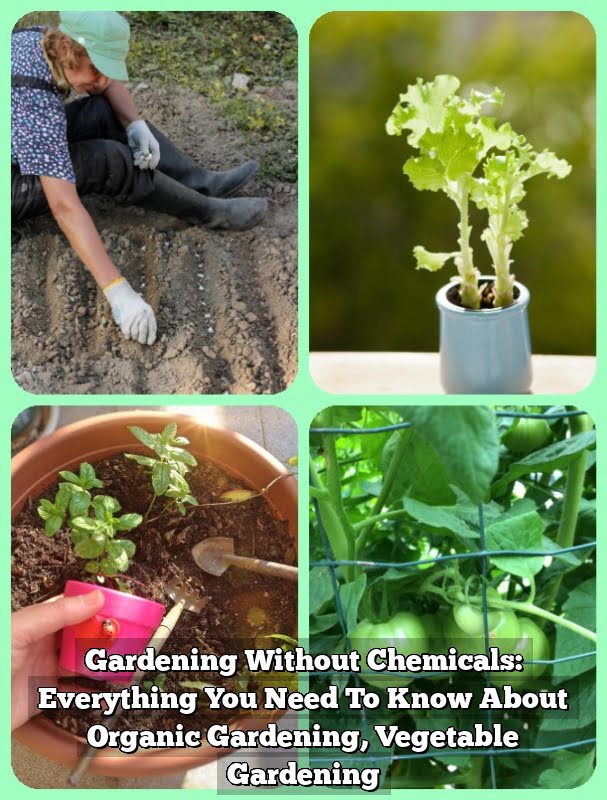What is the importance of vegetable gardening? In recent years, there has been a noticeable increase in the number of people who have taken up vegetable gardening as a hobby. This surge in popularity can be attributed to various reasons, including health benefits, cost savings, environmental impact, and even community building. As more individuals recognize the significance of growing their own produce, it becomes important to understand the underlying reasons for this shift towards self-sustainability.
One of the key factors driving the rise in vegetable gardening is the increasing awareness of the health benefits associated with consuming homegrown vegetables. With concerns about chemical pesticides and GMOs in commercial produce, many are turning to gardening as a way to ensure access to fresh, organic produce rich in essential nutrients.
Furthermore, tending to a garden provides an opportunity for physical activity and wellness benefits, making it an attractive option for those looking to improve their overall well-being.
In addition to personal health benefits, vegetable gardening also plays a crucial role in reducing environmental impact by decreasing carbon footprint and food miles. By growing one’s own vegetables, individuals can minimize their reliance on commercially produced and transported goods, thereby contributing to a more sustainable lifestyle. The significance of these environmental considerations cannot be understated as more people seek ways to reduce their ecological footprint.
Health Benefits
Growing your own vegetables at home can have a major impact on the nutritional value of your diet. Homegrown vegetables are often fresher and more nutrient-dense than store-bought produce, as they are typically harvested at the peak of ripeness.
This means that they retain more vitamins, minerals, and antioxidants that are vital for maintaining good health. By incorporating a variety of homegrown vegetables into your diet, you can ensure that you are getting a wide range of essential nutrients that support overall wellness and disease prevention.
In addition to being more nutrient-dense, homegrown vegetables also offer the advantage of being free from harmful chemicals and pesticides. When you grow your own vegetables, you have control over the growing process and can choose organic and sustainable methods to promote healthy soil and plant growth.
This eliminates the risk of consuming potentially harmful residues commonly found on commercially-grown produce. As a result, homegrown vegetables not only provide greater nutritional value but also contribute to better overall health by reducing exposure to harmful substances.
Furthermore, the act of tending to a vegetable garden itself provides additional health benefits. The physical activity involved in gardening, such as digging, planting, weeding, and harvesting, contributes to increased physical movement and exercise. Engaging in these activities not only promotes better cardiovascular health but also supports muscle strength and flexibility. Additionally, spending time outdoors in nature has been linked to reduced stress levels and improved mental well-being, further contributing to the overall health benefits of vegetable gardening.
Environmental Impact
The environmental impact of vegetable gardening cannot be understated. By growing your own vegetables at home, you can significantly reduce your carbon footprint and food miles.
Carbon Footprint Reduction
Commercially grown vegetables often require large amounts of fossil fuels for transportation, resulting in increased carbon emissions. By opting to grow your own produce at home, you are cutting down on the environmental impact caused by long-distance transportation. This reduction in carbon footprint contributes to a healthier planet and helps combat climate change.
Food Miles Reduction
Food miles refer to the distance that food travels from the point of production to the consumer’s plate. The concept of food miles is closely related to the environmental impact of vegetable gardening, as locally grown produce reduces the need for long-distance transportation.
By cultivating your own vegetables or purchasing them from local farmers, you are supporting a more sustainable and environmentally friendly food system. Reducing food miles not only decreases carbon emissions but also promotes community resilience and self-sufficiency.
Sustainable Practices
In addition to reducing carbon footprint and food miles, vegetable gardening promotes sustainable practices such as organic farming, composting and water conservation. These practices contribute to overall environmental sustainability by minimizing chemical use, promoting biodiversity and conserving natural resources. Overall, the environmental benefits of vegetable gardening make it an essential aspect of sustainable living and responsible consumerism.
Cost Savings
Reduced Grocery Costs
One of the most obvious benefits of vegetable gardening is the significant reduction in grocery costs. By growing your own vegetables, you can save the money that would otherwise be spent on store-bought produce. This can lead to substantial savings, especially for families who consume a large amount of fruits and vegetables on a regular basis. Additionally, by growing your own vegetables, you have full control over the quantity, quality, and variety of produce you have available.
Elimination of Transportation Costs
Another aspect to consider when examining the cost savings of vegetable gardening is the elimination of transportation costs. When you grow your own vegetables at home, there is no need to drive to the grocery store or farmer’s market to purchase produce. This not only saves money on gas but also reduces wear and tear on your vehicle. Over time, these savings can add up and contribute to a more significant overall financial benefit.
Potential for Selling Surplus Produce
In addition to saving money on grocery and transportation costs, vegetable gardening also has the potential to generate income through selling surplus produce. If your garden yields an abundance of vegetables that you cannot consume yourself, you may choose to sell them at a local farmers’ market or directly to neighbors and community members. This additional source of income can further offset the initial investment in starting and maintaining a vegetable garden.
Physical Activity
Engaging in vegetable gardening provides numerous physical activity benefits that can contribute to overall wellness. Spending time in the garden involves various physical tasks such as planting, weeding, watering, and harvesting, which all require movement and muscle engagement. These activities can help improve flexibility, strength, and endurance, which are essential components of a healthy lifestyle.
For example, digging and shoveling soil can promote cardiovascular health and strengthen the upper body muscles. Furthermore, gardening also encourages outdoor activities that expose individuals to natural sunlight, promoting vitamin D production and boosting mood and energy levels.
According to the Centers for Disease Control and Prevention (CDC), gardening is considered a moderate-intensity exercise that can help reduce the risk of obesity, high blood pressure, heart disease, diabetes, osteoporosis, stroke, and depression. The repetitive actions involved in gardening provide a low-impact form of physical exercise that is suitable for individuals of various ages and fitness levels.
In addition to these health benefits, spending time outdoors surrounded by nature is associated with reduced stress levels and improved mental well-being.
In summary, tending to a vegetable garden offers an enjoyable way to engage in physical activity while reaping the rewards of growing fresh produce. It promotes a healthy lifestyle by encouraging regular exercise and outdoor time while also fostering a deeper connection with nature. With its combination of wellness benefits, vegetable gardening stands as an effective tool for promoting overall health among individuals of all ages.
| Benefit | Details |
|---|---|
| Physical Tasks | Movement & Muscle Engagement |
| Cardiovascular Health | Strengthens Upper Body Muscles |
| Mental Well-being | Reduces Stress Levels & Boosts Mood |
Food Security
Vegetable gardening plays a crucial role in ensuring food security by promoting self-sustainability and reducing reliance on commercially produced vegetables. By growing their own fruits and vegetables, individuals can take control of their food sources, ensure access to fresh produce, and reduce dependence on grocery stores or supermarkets. This is particularly important during times of crisis or food shortages, as having a home garden can provide a reliable source of nutritious food.
When individuals rely solely on commercial produce, they are at the mercy of market fluctuations, transportation issues, and potential supply chain disruptions. By cultivating their own vegetable gardens, people can insulate themselves from these external factors and ensure that they have a consistent supply of fresh, healthy produce. This not only provides peace of mind but also contributes to long-term sustainability and resilience within communities.
Another significant aspect of food security through vegetable gardening is the ability to grow specific types of produce that may not be readily available in commercial markets. This diversity allows individuals to have access to a wider range of nutrient-dense foods, thereby enhancing their overall health and well-being. Furthermore, it empowers people to make informed choices about the types of fruits and vegetables they consume, leading to a more balanced diet and better nutritional outcomes.
- Enhances self-sustainability
- Reduces reliance on grocery stores
- Provides a consistent supply of fresh produce
- Increases diversity of nutrient-dense foods
- Promotes informed dietary choices
Educational Value
Gardening has always been a valuable educational tool, and vegetable gardening is no exception. Whether for children or adults, the educational benefits of tending to a garden can have a lasting impact on individuals and communities alike.
One of the key educational benefits of vegetable gardening is the hands-on experience it provides. Being able to plant seeds, watch them grow, and eventually harvest the vegetables gives individuals a real understanding of where their food comes from. This can be especially eye-opening for children who may have never considered how their vegetables end up on their dinner plate.
Additionally, vegetable gardening teaches important life skills such as responsibility, patience, and hard work. Tending to a garden requires consistent care and attention, and individuals will quickly learn the value of dedication and perseverance as they nurture their plants from seedlings to fully grown produce. Furthermore, being involved in the entire process allows both children and adults to develop an appreciation for the environment and nature’s cycles.
Finally, vegetable gardening can serve as an opportunity for learning about biology, ecology, and sustainability. Through observing plant growth, understanding soil health, and recognizing the interconnectedness of ecosystems in a garden setting, individuals can gain a deeper understanding of environmental science concepts that directly apply to real-life situations. Overall, vegetable gardening offers an invaluable educational experience that goes beyond textbooks and classroom lectures.
- Benefits:
- Hands-on learning experience
- Life skills development
- Learning biology, ecology, sustainability
Community Building
Vegetable gardening has the power to bring communities together through shared resources and knowledge. When individuals come together to cultivate a community garden, they are not only contributing to the local food supply but also building a sense of camaraderie and collaboration. Sharing seeds, tools, and expertise fosters a supportive environment where everyone can benefit from each other’s experiences and skills.
Community gardens serve as a space for interaction and connection among neighbors who may not have otherwise crossed paths. As individuals work side by side in the garden, they have the opportunity to share stories, exchange gardening tips, and develop friendships based on a common interest. This sense of community fosters a positive social impact as it promotes unity and cooperation within neighborhoods.
Moreover, community-based vegetable gardening initiatives can lead to the development of educational programs or workshops focused on sustainable practices, composting, water conservation, and more. By sharing knowledge about environmentally friendly gardening techniques, communities can collectively work towards creating a greener and more sustainable environment for future generations. Ultimately, vegetable gardening can serve as a catalyst for fostering stronger bonds within communities while simultaneously promoting environmental awareness and education.
Conclusion
In conclusion, vegetable gardening offers a multitude of benefits that contribute to the overall well-being of individuals and communities. The rising popularity of vegetable gardening reflects a growing awareness of the importance of self-sustainability, environmental impact, and health benefits. Through the cultivation of homegrown vegetables, individuals can experience an array of advantages that extend beyond just having access to fresh produce.
From a health perspective, vegetable gardening provides individuals with the opportunity to consume nutritious and chemical-free vegetables that are rich in essential vitamins and minerals. This can lead to improved health outcomes and a reduced risk of chronic diseases. Additionally, tending to a garden offers physical activity and stress-relief benefits, contributing to overall wellness.
Moreover, from an environmental standpoint, vegetable gardening allows individuals to reduce their carbon footprint by reducing food miles and minimizing reliance on commercially grown produce. This ultimately promotes sustainable living practices and reduces the strain on the environment.
Furthermore, there are also economic advantages as it can lead to significant cost savings on grocery bills while providing a sense of food security through self-sustainability. Overall, the importance of vegetable gardening cannot be understated as it encompasses benefits for both individuals and communities alike.
Frequently Asked Questions
What Are the Benefits of Growing a Vegetable Garden?
Growing a vegetable garden offers numerous benefits, such as providing access to fresh, nutritious produce right at home. It also allows for more control over the growing process, meaning you can avoid harmful chemicals and pesticides. Additionally, gardening provides a great opportunity for physical activity and time spent outdoors, which can have positive effects on both physical and mental health.
Why Is Gardening an Important Skill?
Gardening is an important skill because it not only promotes self-sufficiency by enabling individuals to grow their own food, but it also fosters a deeper connection to nature and an understanding of the natural world. It teaches patience, responsibility, and problem-solving as well.
Plus, having gardening skills can be incredibly useful in times of food scarcity or economic hardship. Overall, gardening is a valuable and practical skill that empowers individuals to take control of their own food supply and well-being.

If you’re looking to get into vegetable gardening, or are just looking for some tips on how to make your current garden better, then you’ve come to the right place! My name is Ethel and I have been gardening for years. In this blog, I’m going to share with you some of my best tips on how to create a successful vegetable garden.





